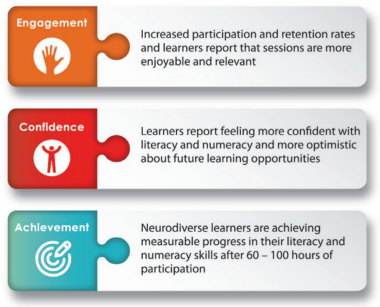Virtual Reality Learning Tools
We are partnering with Animation Research Limited (ARL) to develop virtual reality (VR) learning tools for large-scale delivery to adult and youth learners in prisons and alternative education settings across New Zealand.
Low literacy, numeracy and communication skills create significant barriers for many New Zealanders – ranging from approximately 10-15% of the general population, to 50-60% for individuals in the justice system. Conventional classroom-based approaches to supporting these learners have often re-created the unsuccessful elements of school – resulting in low rates of participation, completion and achievement, and minimal improvements in real world outcomes.
 However, modern tools like virtual reality and augmented reality and provide an opportunity to make foundation learning more engaging, more interactive, and more relevant to the real world aspirations of our adult and youth learners.
However, modern tools like virtual reality and augmented reality and provide an opportunity to make foundation learning more engaging, more interactive, and more relevant to the real world aspirations of our adult and youth learners.
We developed initial VR concept designs in 2016, with research support from University of Otago’s Information Science Department (Prof Holger Regenbrecht & Dr Jonny Collins) to create a prototype version of a virtual mechanic programme.
Since 2017 we have partnered with ARL to co-develop VR learning tools alongside several groups of adult prisoners and high-complexity youth learners – with support from Department of Corrections, and in consultation with dyslexia and speech-language subject matter experts – to ensure the tools are optimised for neurodiverse learners in complex delivery environments.
Features of VR Learning
Our current VR learning tools are contextualised to a realistic vocational setting – a mechanic’s garage. Learners wear virtual reality headsets to fully immerse them in a virtual workshop environment, where they learn real, transferable mechanical skills while performing contextualised literacy and numeracy tasks.
Participants can move around inside the virtual environment and can manipulate engine parts and tools to perform lifelike mechanical tasks that build their core skills for real world application (e.g. pathways to apprenticeships). Tasks can be adapted according to learners’ individual needs and skill levels, and learners can complete incentive-based challenges. Additional learning content is then delivered via tablets – so learners can extend the learning they have initiated in the VR environment, and perform group-based tasks.
Target Learners
Our VR learning targets neurodiverse learners overrepresented in the prison population and in alternative education settings. VR learning is also aimed at learners who have not experienced success in conventional education settings and possess either low confidence, low motivation, mental health challenges, or other complex barriers to successfully engaging with foundation level learning.
Outcomes
A recently completed three month proof-of-concept trial of VR learning tools with a cohort of neurodiverse prison learners at Otago Corrections Facility has demonstrated significant gains in learner engagement and confidence, and measureable progress in literacy and numeracy assessments using the ALNAT assessment tool.
Next Steps
MMS and ARL are now preparing to develop a comprehensive VR learning platform capable of delivery at national scale to Corrections and alternative education settings via a network third-party education providers with supported access to the learning platform and content.
Partners
Animation Research Limited: ARL is a world-leading computer graphics production house, turning digital data into pictures. ARL specializes in real-time 3D sports graphics, 3D television graphics, 3D stereographics and 3D data visualization tools. ARL delivers graphics for America’s Cup, ICC, the PGA Tour, Major League Baseball, Formula One and a range of innovative commercial projects. https://arl.co.nz/
